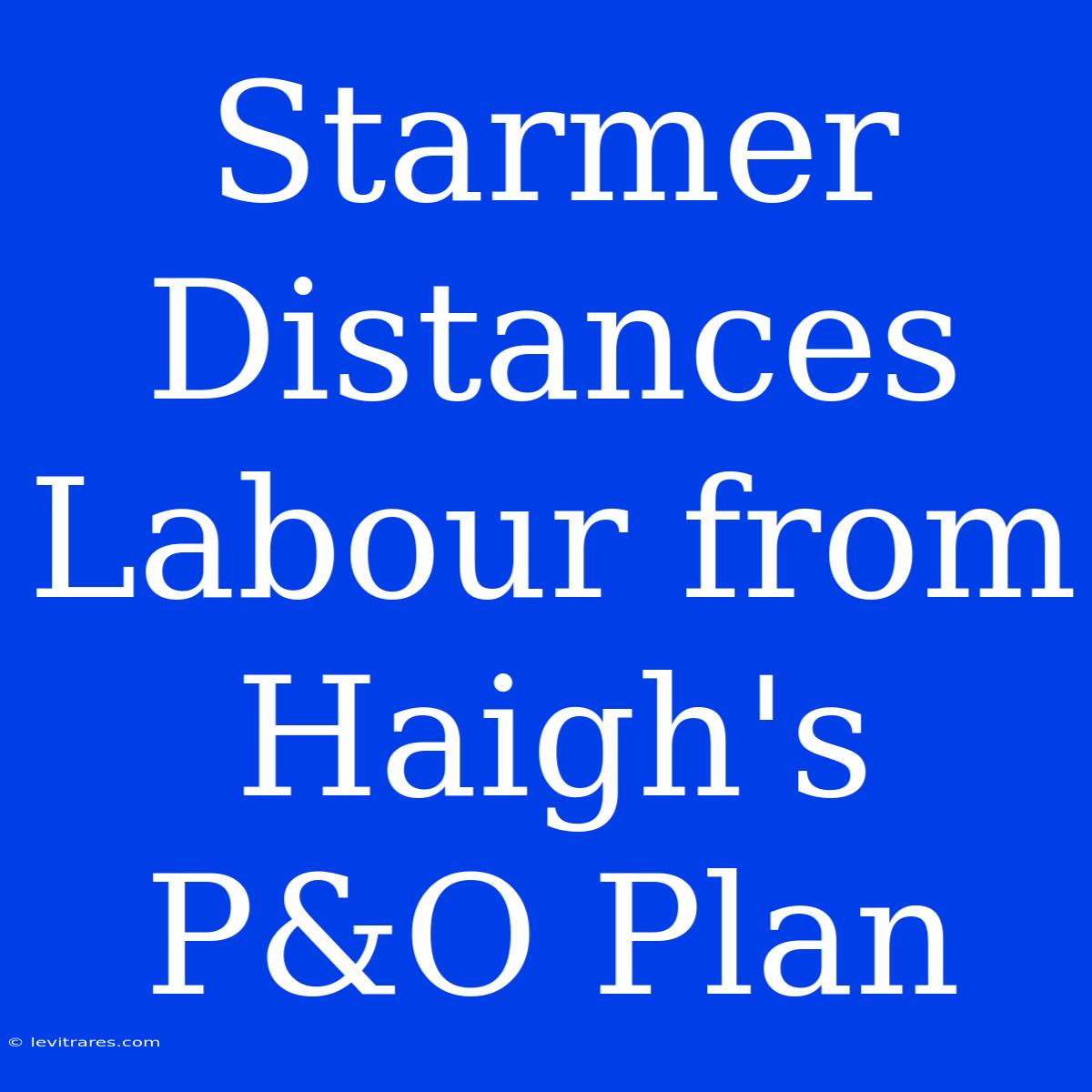Starmer Distances Labour from Haigh's P&O Plan: A Move Towards Pragmatism or Political Calculation?
Is Labour moving away from its traditional support for unions and workers' rights? The recent announcement by Labour leader Sir Keir Starmer distancing his party from shadow transport secretary Louise Haigh's proposal to nationalize P&O Ferries has raised eyebrows and ignited debate. This decision, while seemingly pragmatic, could be interpreted as a shift in Labour's core principles.
Editor Note: This article delves into the recent controversy surrounding Labour's stance on the P&O Ferries crisis, analyzing the potential motivations behind Starmer's decision and its implications for the party's future.
This topic is crucial to understand because it showcases Labour's approach to tackling complex economic issues like job security, industrial relations, and privatization. It also reveals how the party is navigating the delicate balance between appealing to traditional Labour voters while seeking to gain broader appeal in the face of a changing political landscape.
Our analysis explores:
- Labour's historical relationship with trade unions.
- The P&O Ferries crisis and the various proposals to address it.
- The potential impact of Starmer's decision on Labour's image and future.
- The role of public opinion in shaping political strategies.
Key Takeaways:
| Aspect | Description |
|---|---|
| Labour's Stance on Nationalization | Traditionally, Labour has favoured nationalization, particularly in sectors deemed vital to the public interest. However, the party has shown a shift towards more pragmatic solutions in recent years. |
| Haigh's Proposal and Starmer's Response | Haigh's proposal to nationalize P&O Ferries was seen as a bold move to address the crisis. However, Starmer's decision to distance himself from it could signal a more cautious approach to intervention. |
| Public Opinion and Political Strategy | Starmer's decision may be driven by a desire to appeal to a wider audience, particularly those who view nationalization as a radical or inefficient solution. |
| Implications for Labour's Future | This move could impact Labour's relationship with trade unions, potentially creating a divide within the party's base. It also raises questions about Labour's commitment to workers' rights and its future economic policies. |
Labour's Historical Relationship with Trade Unions
Labour has always had a close association with trade unions, with the latter forming the core of its political base. Traditionally, Labour has championed the cause of workers' rights, advocating for fairer wages, better working conditions, and protection against exploitation. Nationalization has been a key tool in achieving this, with the party historically favouring state ownership of key industries.
The P&O Ferries Crisis and Potential Solutions
The P&O Ferries crisis sparked widespread public outrage when the company abruptly fired 800 employees without notice, replacing them with cheaper agency staff. This move was seen as a blatant disregard for worker rights and fuelled calls for action. Haigh's proposal for nationalization was one response to this crisis, offering a potential solution to protect jobs and ensure stability in the ferry industry.
Other proposals included stronger regulations for companies that operate in the public interest, government intervention to secure employment for those affected, and a complete ban on the use of agency workers in certain situations. These different approaches highlight the complexity of the issue and the range of opinions on how to address it.
Starmer's Decision and Its Implications
Starmer's decision to distance Labour from Haigh's proposal was met with mixed reactions. While some saw it as a pragmatic approach, acknowledging the complexities of nationalization and the need for a more nuanced solution, others viewed it as a betrayal of Labour's core values and a capitulation to the Conservative Party's agenda.
This decision has raised questions about Labour's future direction. It could be interpreted as a shift towards a more centrist approach, seeking to appeal to a broader electorate beyond its traditional base. However, it also carries the risk of alienating core Labour supporters who view the party's historic commitment to workers' rights as fundamental.
Public Opinion and Political Strategy
It's important to consider the role of public opinion in shaping political strategies. While Labour has traditionally championed workers' rights, the party is also aware of the need to appeal to a wider audience in order to gain electoral success. Nationalization is often seen as a radical policy, particularly among those who favour a more market-driven economy. By distancing himself from Haigh's proposal, Starmer may be seeking to appeal to a more centrist voter base and avoid alienating potential supporters who are wary of government intervention.
Conclusion
The recent controversy surrounding Labour's stance on the P&O Ferries crisis highlights the party's current state of flux. Starmer's decision to distance himself from Haigh's nationalization proposal signals a potential shift in Labour's political strategy. This move, while seemingly pragmatic, carries the risk of alienating core supporters and raises questions about the party's future direction. It remains to be seen whether this decision reflects a genuine commitment to pragmatic solutions or a strategic move to appeal to a broader electorate. The implications of this decision for Labour's future will continue to be debated in the months and years to come.

